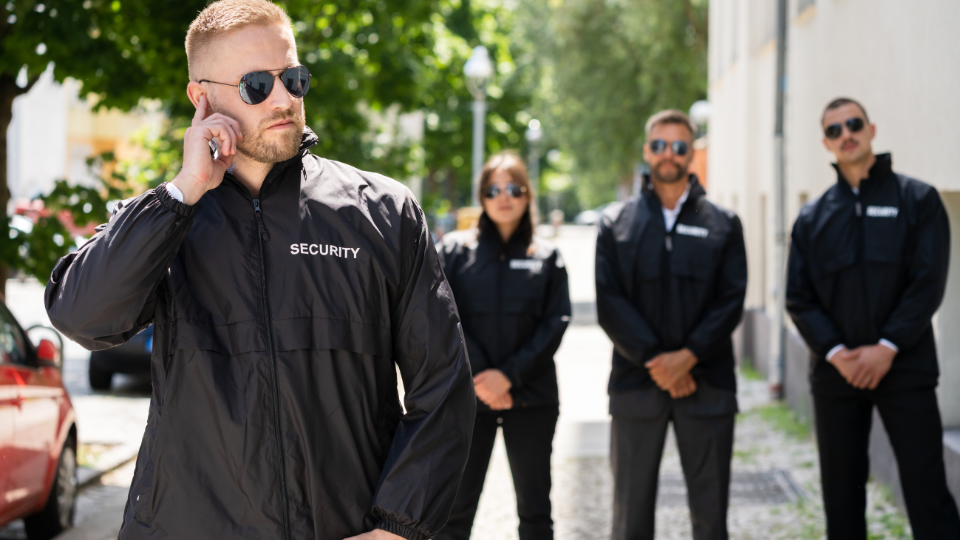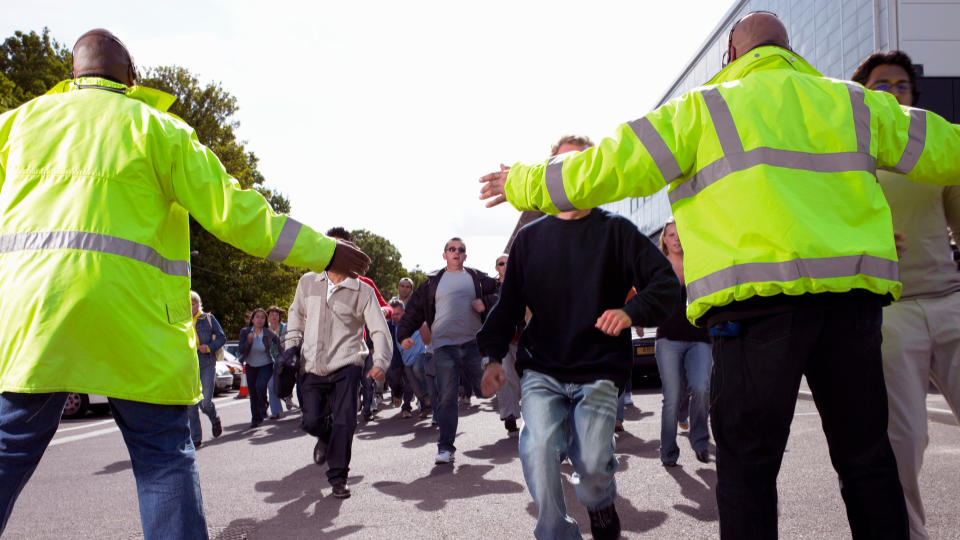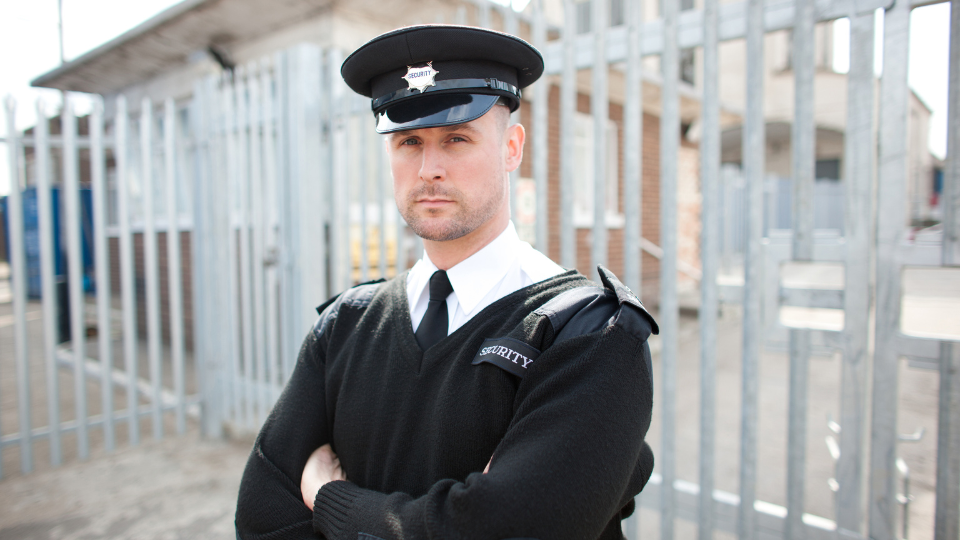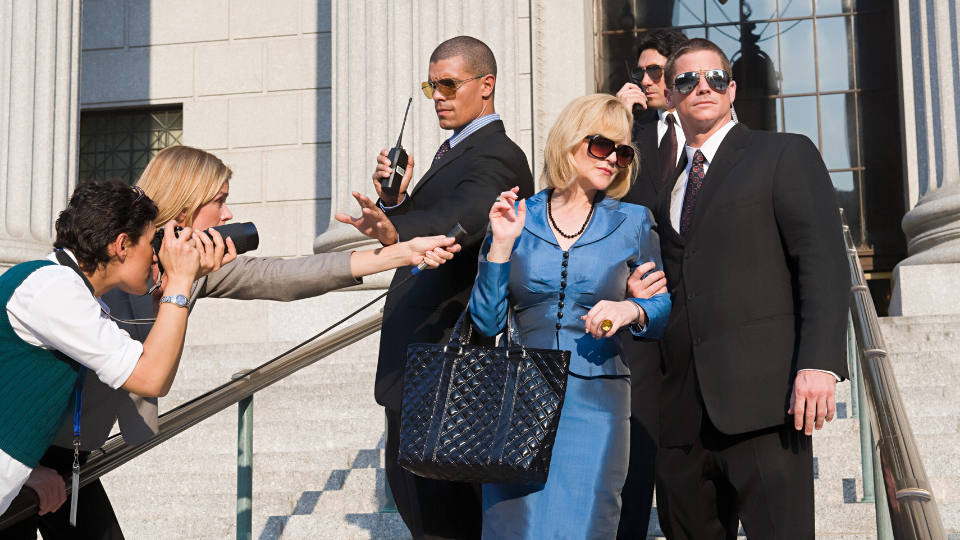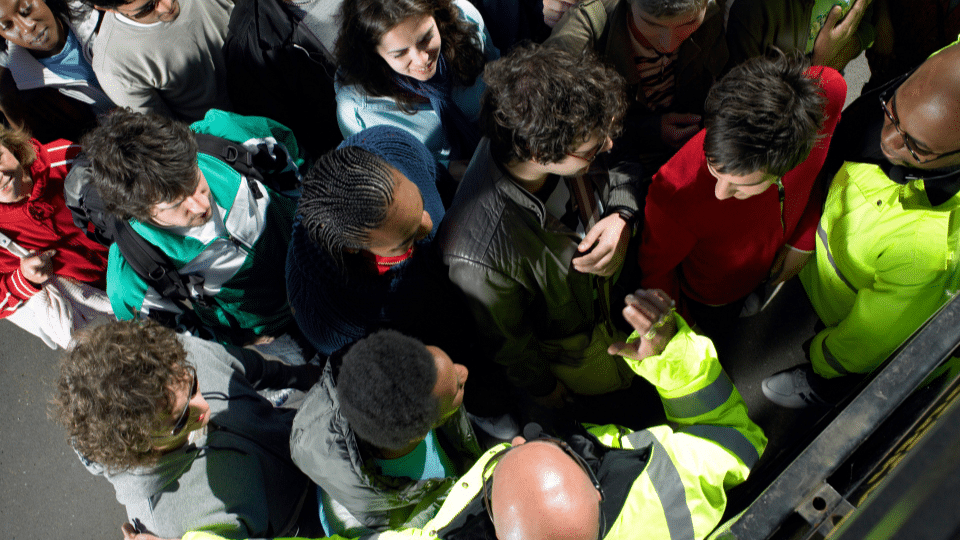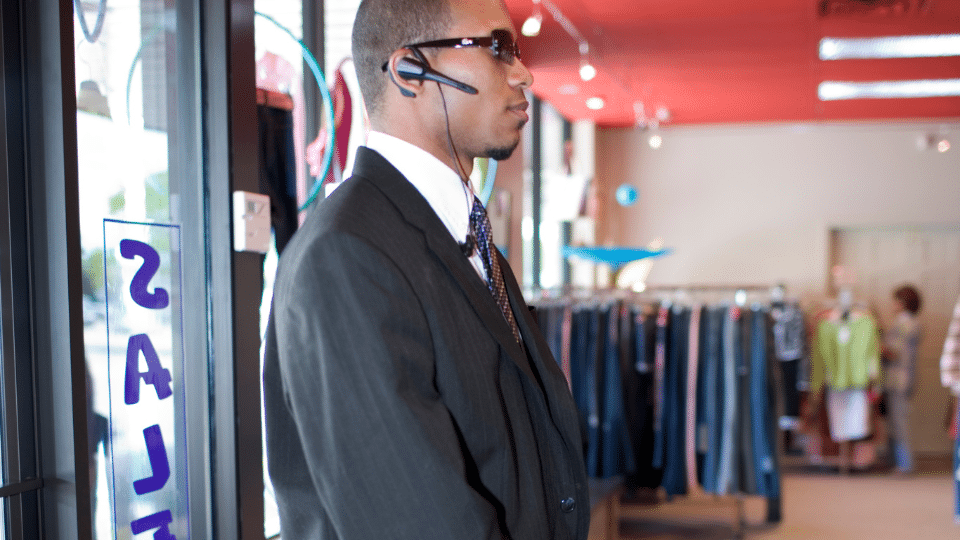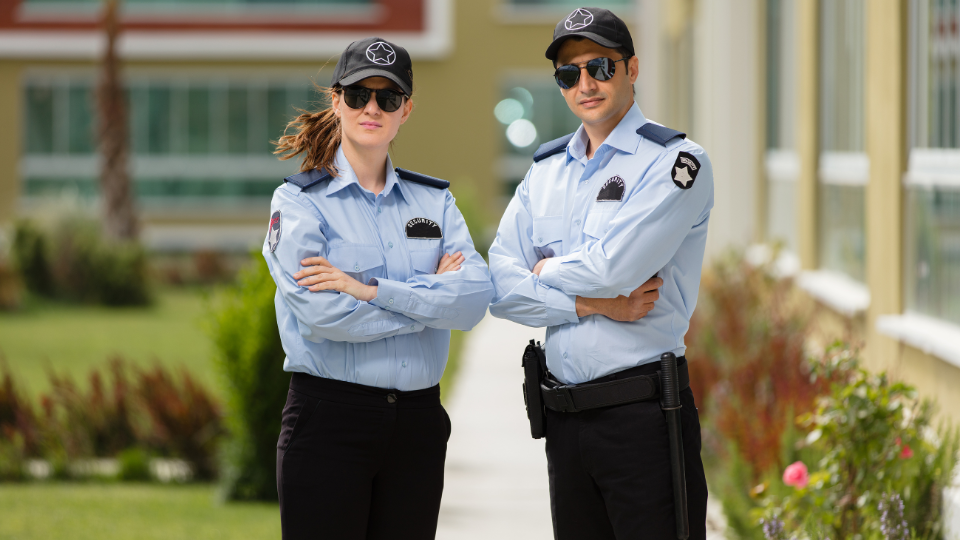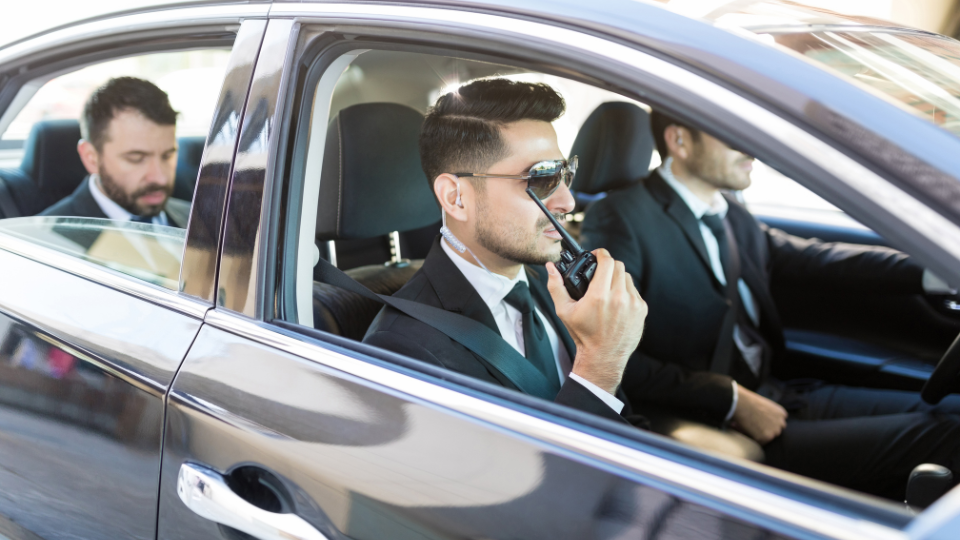The security industry in Australia is huge–according to a report by the Australian Strategic Policy institute in 2018, it has ‘more than double the personnel of Australia’s combined police agencies and permanent Australian Defence Force’. And accordingly, for such a vast industry, work in security is incredibly varied. There is something to suit every type of person, whether you want an active job or something more sedentary, regardless of your sex.
Having plenty of options is great, but if you wanted to decide on a career in security, how would you begin to work out what area you wanted to aim for? As you’ll see below, there can be a lot of overlap between different types of security guards, but we’ll try to categorise some of the different kinds you’ll find in Australia today. Any time a type of guard is mentioned in passing, and there’s a section devoted to it elsewhere in the article, that term will be in bold.
Security Guard Training
The starting point for any career in security is enrolling in the Certificate II in Security Operations. This is an entry-level qualification that anyone over 18 can do, and it’s enough to qualify you for a lot of the work described here. We’ll point out when specific training beyond this is necessary or may be helpful for a particular role.
Other Requirements For Working As a Security Guard
In addition to training, security guards need good enough literacy and numeracy skills to communicate with the public and read signs and instructions (if you enrol for training, your training provider may evaluate your skills with a Language Literacy and Numeracy (LLN) Assessment), and decent physical fitness.
Unarmed Guard
This is where most security guards begin their careers after completing Certificate II in Security Operations. An unarmed guard is a licensed security guard that doesn’t carry a firearm. Unarmed guards can do extra training to earn the right to carry batons or handcuffs in the form of some individual units from the qualifications Certificate III in Security Operations and Certificate III in Close Protection Operations if their work requires it, depending on licensing regulations in that state or territory. Unarmed guards can work in various industries and types of businesses–a security guard in most of the roles we talk about here is more likely to be unarmed than armed, except, perhaps, in the case of cash-in-transit guards.
You might wonder why someone would hire an unarmed guard when they could hire an armed guard. The main reason is that an unarmed guard is less expensive. An armed guard has to go through extra training and licensing to be able to use firearms. This and the extra danger of the work done by armed guards means they can charge more for their services.
Armed Guard
As we’ve just said, armed guards have to do extra training and licensing, and because of this, they’re paid more. The government takes the extra-legal and moral responsibility involved with work as an armed guard seriously, as evidenced by the huge amount of legislation covering it. In Queensland, for example, there are rules around what kind of guns are acceptable for use by armed guards, what kind of work necessitates having a weapon and where it has to be kept.
Special training
For an already licensed security guard to be approved for carrying firearms as part of their work, they need extra endorsements to their licence. This usually involves training in the form of firearms units from Certificate III in Security Operations. There are various other conditions depending on the state or territory. For example, to apply for a firearms endorsement in Western Australia, you need to present a medical certificate and have a set of fingerprints taken.
The likelihood that employers will use an armed guard for security work increases with the area’s dangerousness and the value of what’s being guarded. For example, you might find armed guards stationed in banks or high-end jewellery shops.
Static Security Guard
Also called: stationary guard. A static security guard is, as the name suggests, one who stays in place. Or at least mostly stays in place: security guards may have both static and mobile duties as part of their jobs, going on patrols at set intervals. Security guards of most types can be static, including business guards, crowd controllers, or monitoring security officers. Static security guards are often placed at strategic locations where they can see each other. Their presence may provide a powerful deterrent against crime, especially if they are also uniformed guards.
Depending on the environment they work in, the duties of a static guard may include:
- Protecting the premises from criminal activity or unauthorised access
- Safeguarding the premises from flood, fire and other damage
- Preventing accidents
- Preventing and reducing a company’s waste
- Ensuring that rules and regulations are followed, for example, rules against smoking indoors
- Access control, for example, concierge duty as a customer service guard behind a reception desk or admitting members of the public as a gatehouse operator
- Guarding equipment or valuables as part of loss prevention measures
- Working at events as crowd controllers
- Securing a scene
- Personal protection of individuals at one location, but not close protection, or being a bodyguard
- Monitoring CCTV and other security systems as a monitoring security officer
Mobile Security Guard
Also called: patrol guard. Another kind of security guard with a fairly self-explanatory name, a mobile security guard is any security guard who moves around as part of their duties. As explained above, security work is often partly mobile and partly static, and many guards must periodically patrol the premises at set times (but not always at the same time–patrols may be deliberately varied to make life more difficult for individuals planning criminal activity). A mobile guard must be observant, alert and ready to respond to threats, but their presence alone can deter crime. Employers use mobile security guards in any environment where there’s a lot of ground to cover, like shopping malls, airports and universities.
Customer Service Guard
Also called: corporate security, concierge (please note: security guards are sometimes concierges, but not all people with the title of a concierge are security guards). A customer service guard has a stationary post at the front desk of a business. Because they create a first impression on customers, they must have good grooming and presentation and may or may not be in uniform. Part of their role is access control, much like a gatehouse guard but indoors, keeping track of who enters the premises and often taking down details. They will also perform general customer service duties, like welcoming customers and answering general questions.
Gatehouse Guard
Also called: gatehouse operator. A gatehouse guard is a security guard who performs access control from a gatehouse at the outdoor entry to the premises or some zone within it. They admit members of the public in a controlled way–they may take names, look at identification or receive payment. They may work in environments including hospitals, business parks, international and domestic logistic terminals, or in residential areas as residential security guards. In the gatehouse, they may have CCTV screens they need to monitor.
A gatehouse guard’s duties may include:
- Greeting customers or clients
- Giving directions
- Booking people into and out of the premises
- Controlling access to the premises, including keeping records of visitors
- Handing out passes
- Vehicle and bag searches
- Cash handling if payments are required
Residential Security Guard
A residential security guard monitors the safety of private homes, usually either apartment buildings or gated communities. They may control access to the building or community, sometimes outdoors as gatehouse guards. They may also keep visitor logs, open and close gates at set times and provide general help to residents. In addition to these static duties, they may also be mobile, conducting patrols and responding to residents’ security concerns.
Bodyguard
Also called: executive guards, executive security, executive protection officers, personal protection officers, close protection operatives, close personal protection operatives. A bodyguard is a security guard whose task is protecting a particular client, or ‘principal’; this is usually some VIP, like a celebrity or politician. The protection can extend to others, like family members. A bodyguard must be very observant and aware of their surroundings to watch for threats, even in noisy, surging crowds. It is illegal for a bodyguard to be armed in Australia–one exception is the armed guards who protect politicians, but these are members of the Australian Federal Police (AFP), not private security guards. Clients often like bodyguards to be discreet, so they are likely to be in plain clothes.
Special training
Bodyguards continue their training after completing Certificate II in Security Operations with extra training in close protection. Different states and territories have different requirements for the training needed to get a bodyguard endorsement for a security licence. In some states and territories, it may be possible to fulfil the conditions with only a few extra units of competency, but in others, you may have to do a whole Certificate III in Close Protection. If you’re interested in becoming a bodyguard, check the current licensing requirements in your area.
Crowd Controller
Also called: event guard, event security guard. A crowd controller is a security guard who monitors the safety of large groups of people in environments like concerts and sporting events. These may be mobile or static, depending on the tasks assigned to them. They are usually employed by larger security firms.
The duties of a crowd controller may include:
- Keeping crowds moving
- Keeping people in the areas where they should be and out of the areas they shouldn’t be
- Access control, including issuing passes
- Giving directions to visitors
- Being a general deterrent to bad behaviour, especially as they are usually uniformed
Monitoring Security Officer
Also called: remote video surveillance agent, security control room operator, monitoring centre operator, video surveillance operator. A type of static guard, a monitoring security officer has to watch camera feeds or alarm systems for signs of irregularities like trespassing or theft. These guards generally work in a control room or monitoring centre, which may have many screens, demanding a strong ability to focus and tune out distractions. This room may be at the premises being guarded (a control room) or at a remote location if they’re working for an organisation that responds to burglar alarms for many homes and businesses (a monitoring centre). They may need to perform system checks to ensure the equipment is working properly.
Special training
You generally don’t need any special training beyond Certificate II in Security Operations to do this job (see Monitoring Centre Operator Licence and Training on this page). However, some material in the Certificate III in Security Operations deals directly with monitoring CCTV systems.
Business Guard
A business guard is simply any guard who protects a business of any kind, including warehouses, corporate environments, shops and bars. Of course, the work varies with the environment and the type of business in question (of course, a retail guard is a kind of business guard).
Duties of a business guard may include:
- Controlling access to the premises
- Acting as an on-site liaison to emergency services
- Ensuring security best practices are followed
- Assisting employees entering and exiting the premises
- Managing security cameras, alarms, and equipment
Business guards, including retail guards, may be static or mobile (or divide their duties between both). They may be armed or unarmed. They can be in uniform or plainclothes.
Retail Guard
Retail guards are business guards tasked with preventing theft in retail environments. They do this by:
- Greeting customers entering the store
- Checking bags of customers exiting the store
- Monitoring security cameras
- Patrolling the premises
- Investigating suspicious activity, including suspected theft
- Dealing with law enforcement when theft happens
Proprietary Security Guard
Also called: in-house security guard. A proprietary security guard is one who is employed directly by the business they’re guarding rather than being contracted through a security company. Companies may prefer to hire security guards directly because it can give them more control over how they work, whereas contract staff will follow their company’s way of doing things.
Contract Security Guard
As opposed to a proprietary security guard, a contract security guard is hired through a third-party security company. Companies may prefer to hire contract staff for their security needs because it’s usually cheaper and faster to get workers in place this way than it is to put together their own security team from scratch.
Uniformed Security Guard
Most of the types of security guards here could be either uniformed or in plainclothes. The chief benefit of a security guard in uniform is that everyone knows they’re a security guard–they’re a deterrent to crime and other bad behaviour.
Plainclothes Security Guard
The power of uniformed guards to deter crime is a big plus, but security guards in plainclothes have major benefits, too, including:
- They may be less intimidating to customers
- They make it more difficult for those planning crimes to observe and predict security guards’ routines, for example, to monitor the times patrols occur
- They make it easier to catch out the business’s own employees if they’re doing something criminal
- Where uniformed guards can deter crime from happening, the inconspicuousness of plainclothes security guards can make criminals like shoplifters less careful and easier to catch
Cash-In-Transit Guard
A cash-in-transit guard protects goods or people in transport. A classic example of this is a uniformed armed guard driving an armoured car to collect money from a bank or shop, but cash in transit guards can be uniformed or plainclothes.
Special training
In Australia, this kind of work entails having a special kind of security licence, and to get this, you generally have to get special training for cash-in-transit work. For example, in Queensland, you need to do every unit included in the Certificate II in Security Operations plus three electives specifically about cash in transit that come from the Certificate III in Security Operations. If you’ll be using firearms on the job (and many cash-in-transit guards are armed), you’ll also need to get a firearms licence and have the relevant training.
We’ve learned a bit more about the different kinds of security guards in Australia and how these different categories overlap. If you want to become a security guard, you still may not be sure which kind, but no matter what kind of security role you decide to aim for, a Certificate II in Security Operations is the perfect starting point.

